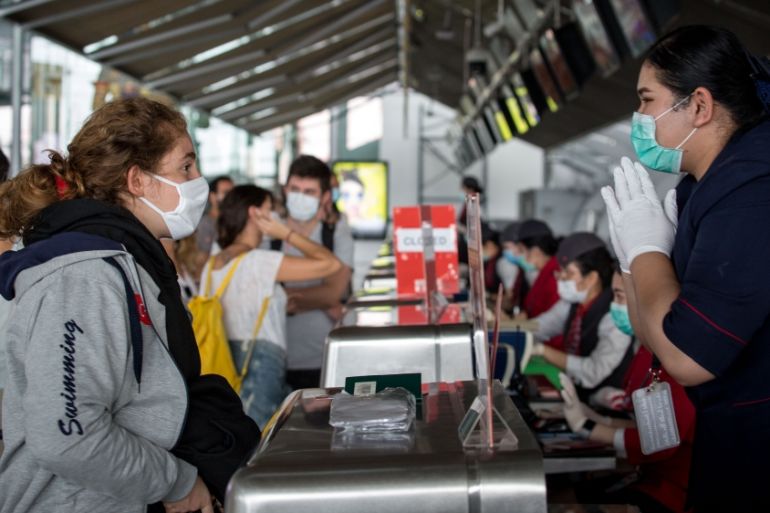Coronavirus: International travel in these strange times
Al Jazeera’s Wayne Hay describes the new-normal he experiences as he arrives in Thailand.

Every day, three times a day, I hear the shuffle outside my room, followed by a phone ringing in the distance. It’s come to be an important, even exciting, sound because I know it means a break in the monotony of quarantine. It means mealtime.
The sound is coming from the room of my one and only neighbour, just across the hallway. They’re being contacted by hotel staff to tell him or her their meal has arrived.
Keep reading
list of 4 itemsMexico’s teachers seek relief from pandemic-era spike in school robberies
‘A bad chapter’: Tracing the origins of Ecuador’s rise in gang violence
Why is the US economy so resilient?
I’ve never seen my neighbour; I just hear the door open, a rustling of the plastic bag containing the latest gastronomic offering, and the door close behind them.
I’m not sure why my neighbour is phoned before me. That’s just the way it is, but sure enough, right after their call, comes mine and a friendly voice tells me what I already know, that my carefully packaged breakfast, lunch or dinner has been left on a seat outside my room.
Sometimes I see the delivery person scurrying away down the hallway in their plastic suit designed to protect them from any coronavirus threat that may be lurking in the guests who recently returned to Thailand from overseas. But more often than not, the deliverer is long gone by the time I get out there.
It’s very much a drop and run situation, which for me, perpetuates the strange experience of being in quarantine during a global pandemic. We returnees are untouchable for 14 days.
I arrived in Bangkok after paying for a seat on a repatriation flight from New Zealand to Thailand, the second to be arranged between the two countries.
The first was exclusively for Thai citizens who wanted to go home. A second was organised and opened to work-permit holders like me to also apply.
Upon departure, Auckland Airport was largely devoid of life, with all shops and restaurants closed, in some cases boarded up, waiting for better days to return when passengers could grab a bottle from duty free or pass the time in a book shop or cafe before boarding their flight.
Instead, the atmosphere was perhaps a throwback to a time when terminals were simply functional buildings for walking through to get to the departure gate, as opposed to today’s, or should I say yesterday’s, experience which can be more like going to a shopping mall than an airport.
After an 11-hour flight that was fairly normal apart from temperature checks and airline staff wearing protective equipment, the arrival at Bangkok airport had me thinking about the future instead of a bygone era.
Disembarking, we were greeted by what seemed like hundreds of medical personnel, immigration officers, police, military and other government officials. It was organised chaos.
There were lines formed for people to check if we had the right documents such as a medical certificate, health insurance, confirmation of a reservation in a quarantine hotel, and a letter from the Thai embassy.
I couldn’t help wonder if having to carry a wad of documentation might be a feature of international travel for years to come.
Arrival at my quarantine hotel was similarly bustling. Instead of a five-star welcome in the lobby, complete with cold towels and a refreshing drink, I was driven to the car park and greeted by more people in protective suits. This has become my new normal.
After more medical checks, it was off to my room, my new home for the next 14 days, and two invasive coronavirus tests.
|
|
Foreigners returning to Thailand have no choice but to pay for a quarantine hotel while Thai citizens can choose the free option, which is paid for by the government, but comes with a catch.
They may have to share a room with a stranger. Seems odd to me, given the reason for quarantining in the first place.
For obvious reasons, there is little face-to-face interaction with other humans in the hotel.
Most communication with staff or medical workers is done over an app, and we’re allowed outside our rooms, to another floor, once every two days while the room is cleaned. It’s a good opportunity to store up some much-needed vitamin D, thanks to the sun.
The taste of the outside world lasts around 30 minutes, then I’m ushered back to the room, just in time to hear my neighbour’s phone ringing.